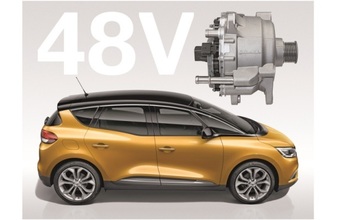
However, the 48-volt system facilitates significant savings. Therefore, with the mild-hybrid system, Renault is aiming for combined fuel consumption of 3.5 liters of diesel per 100 km.
They are also aiming to reduce the new Scénic´s CO2 emissions to 92 grams per kilometer, which is a new CO2 benchmark in this vehicle class. This is possible because the electric motor, operated as a generator, also converts a large proportion of the braking energy into electricity, which is temporarily stored in a small battery.
This electricity can then be specifically used to relieve the internal combustion engine. This is also the reason why nitrogen oxide emissions and exhaust particles, especially in urban traffic, are reduced when a 48-volt drive is combined with a diesel engine.
"We are proud that we were able to secure Renault as the first customer for our innovative 48-volt drive," said José Avila, Continental Executive Board Member responsible for the Powertrain Division.
"Other production launches for both diesel and gasoline vehicles are in the pipeline for Europe and other markets including China and North America." According to Continental, the market for 48-volt drives will experience significant growth in the coming years. As Rudolf Stark, Head of the Hybrid Electric Vehicle Business Unit, assumed, "in 2030, approximately one in four new vehicles across the world will be equipped with a 48-volt drive."
END


























